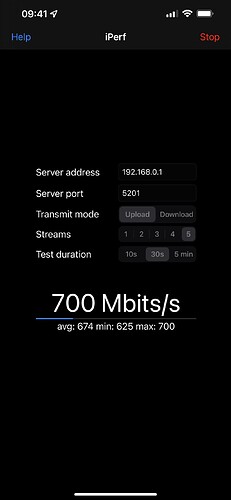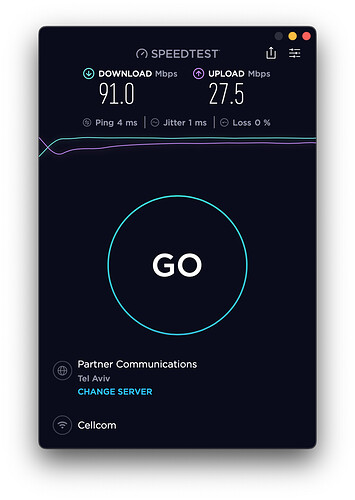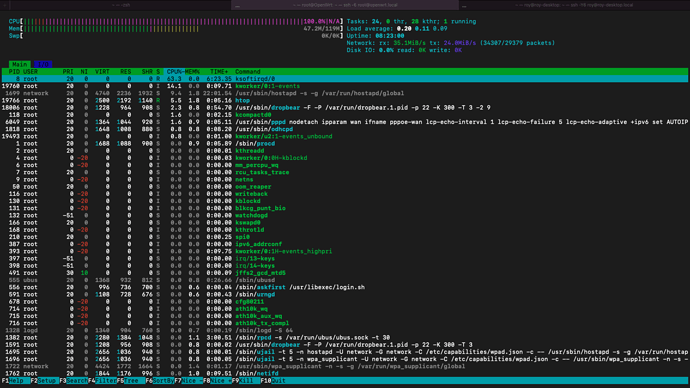Hi,
It it worth to install wrt in current status instead of tplink firmware which has no updates currently?
It is my primary router so nating and dhcp server is must have. Will be worse or better on owrt? I'm using a6 in wds bridging Mode also for extending wifi range.
Greetings!
This is iperf3 on C7 v2, measuring upload from my iphone. Using latest image, 80MHz 5GHz channel. 1GHz OC. Download is slightly slower (around 500Mbit/sec). I use them as dumb AP's so throughput is LAN to LAN only.
This is quite fantastic for 8 year old router and it will take long time for me to justify move to .ax
Do you have to change any default setting to get these speeds? I'm using TP-Link Archer C7 v5 and I never got its 5GHz speed to exceed 100 Mbps. Been using since 21.02 IIRC, and 802.11ac has always been the same. Nothing in the LuCi settings jumps out to me as the cause for this limit, and the previous replies here implies you all getting 300Mbps after firmware updates is even more confusing to me. Should I be enabling some software or hadrware offloading somewhere?
Just today I learned about forcing 40MHz channel width for bgn and that resulted on my 2.4GHz reaching almost 100Mbps. I hope there's a similar small change to get my 5GHz in order.
Make it 80mhz in 5ghz band.
I checked it again and it's already 80MHz. AFAIR, it was always 80MHz by default. And there's literally zero 5GHz signals in the vicinity, so there's no crowding, let alone any interference.
Are you doing a speedtest or iperf? It looks like you maybe limited by the 100mbps speed of the lan port?
Doing a speed test, I'll not be able to do iperf anytime soon. But it's nothing to do with FE speeds, my router is all gigabit, and the upstream ISP interface is also gigabit (the service I'm supposed to get is 250Mbps). With a LAN connection, speed test easily goes above and beyond 100Mbps, so this is squarely a WiFi issue.
I have the same problem:
root@OpenWrt:~$ cat /etc/config/wireless
config wifi-device 'radio0'
option type 'mac80211'
option path 'pci0000:00/0000:00:00.0'
option channel '36'
option band '5g'
option htmode 'VHT80'
option country 'IL'
option cell_density '0'
config wifi-iface 'default_radio0'
option device 'radio0'
option network 'lan'
option mode 'ap'
option ssid 'Roy&Karin'
option encryption 'sae-mixed'
option key 'EngineeringPoyke'
option wpa_disable_eapol_key_retries '1'
config wifi-device 'radio1'
option type 'mac80211'
option path 'platform/ahb/18100000.wmac'
option channel '1'
option band '2g'
option htmode 'HT40'
option country 'IL'
option cell_density '0'
config wifi-iface 'default_radio1'
option device 'radio1'
option network 'lan'
option mode 'ap'
option ssid 'RoyAndKarin'
option encryption 'sae-mixed'
option key 'EngineeringPoyke'
option wpa_disable_eapol_key_retries '1'
royash@Roys-MBP ~ % /System/Library/PrivateFrameworks/Apple80211.framework/Versions/Current/Resources/airport -I
agrCtlRSSI: -35
agrExtRSSI: 0
agrCtlNoise: -92
agrExtNoise: 0
state: running
op mode: station
lastTxRate: 780
maxRate: 867
lastAssocStatus: 0
802.11 auth: open
link auth: wpa3-sae
BSSID:
SSID: Roy&Karin
MCS: 9
guardInterval: 800
NSS: 2
channel: 36,80
My ISP gives me 300 Mbps download and 30 Mbps upload.
In addition, when I choose in openwrt the frequency to be on auto mode, the network doesn't appear on my raspberry pi 4.
Is there any way to improve the download speed?
Enable offloading from firewall menu.
This is what I already did, it gave me 3-4 Mbps improvement, all the results are after I've enabled it.
My network config (without PPPoE username & password obviously)
root@OpenWrt:~$ cat /etc/config/network
config interface 'loopback'
option device 'lo'
option proto 'static'
option ipaddr '127.0.0.1'
option netmask '255.0.0.0'
config globals 'globals'
option ula_prefix 'fdcb:da54:3188::/48'
option packet_steering '1'
config device
option name 'br-lan'
option type 'bridge'
list ports 'eth0.1'
config interface 'lan'
option device 'br-lan'
option proto 'static'
option ipaddr '192.168.1.1'
option netmask '255.255.255.0'
option ip6assign '60'
list dns 'fdcb:da54:3188::1fe'
config interface 'wan'
option device 'eth0.2'
option proto 'pppoe'
option username '_________'
option password '_________'
option ipv6 'auto'
option peerdns '0'
list dns '2606:4700:4700::1112'
list dns '2606:4700:4700::1002'
config switch
option name 'switch0'
option reset '1'
option enable_vlan '1'
config switch_vlan
option device 'switch0'
option vlan '1'
option ports '2 3 4 5 0t'
config switch_vlan
option device 'switch0'
option vlan '2'
option ports '1 0t'
I've gotten around to doing iperf3 with my Linux laptop as client:
$ iperf3 -c openwrt
Connecting to host openwrt, port 5201
[ 5] local fdb4:dc8b:aa03:0:19f1:6a8a:1c9c:c191 port 47000 connected to fdb4:dc8b:aa03::1 port 5201
[ ID] Interval Transfer Bitrate Retr Cwnd
[ 5] 0.00-1.00 sec 15.0 MBytes 126 Mbits/sec 0 1.05 MBytes
[ 5] 1.00-2.00 sec 10.0 MBytes 83.9 Mbits/sec 64 527 KBytes
[ 5] 2.00-3.00 sec 12.5 MBytes 105 Mbits/sec 48 387 KBytes
[ 5] 3.00-4.00 sec 22.5 MBytes 189 Mbits/sec 0 415 KBytes
[ 5] 4.00-5.00 sec 22.5 MBytes 189 Mbits/sec 7 309 KBytes
[ 5] 5.00-6.00 sec 23.8 MBytes 199 Mbits/sec 0 343 KBytes
[ 5] 6.00-7.00 sec 21.2 MBytes 178 Mbits/sec 0 362 KBytes
[ 5] 7.00-8.00 sec 23.8 MBytes 199 Mbits/sec 11 291 KBytes
[ 5] 8.00-9.00 sec 23.8 MBytes 199 Mbits/sec 20 236 KBytes
[ 5] 9.00-10.00 sec 25.0 MBytes 210 Mbits/sec 0 298 KBytes
- - - - - - - - - - - - - - - - - - - - - - - - -
[ ID] Interval Transfer Bitrate Retr
[ 5] 0.00-10.00 sec 200 MBytes 168 Mbits/sec 150 sender
[ 5] 0.00-10.01 sec 196 MBytes 165 Mbits/sec receiver
iperf Done.
Following is the config on my TP-Link Archer C7 v5:
# cat /etc/config/wireless
config wifi-device 'radio0'
option type 'mac80211'
option hwmode '11a'
option path 'pci0000:00/0000:00:00.0'
option htmode 'VHT80'
option country 'AE'
option cell_density '0'
option channel 'auto'
config wifi-iface 'default_radio0'
option device 'radio0'
option network 'lan'
option mode 'ap'
option key 'password'
option ssid 'SSID'
option ieee80211w '1'
option encryption 'sae-mixed'
config wifi-device 'radio1'
option type 'mac80211'
option hwmode '11g'
option path 'platform/ahb/18100000.wmac'
option country 'AE'
option cell_density '0'
option channel 'auto'
option htmode 'HT40'
config wifi-iface 'default_radio1'
option device 'radio1'
option network 'lan'
option mode 'ap'
option key 'password'
option ssid 'SSID'
option ieee80211w '1'
option encryption 'sae-mixed'
I have two more SSIDs (on each frequency) which I removed for abbreviation. I've confirmed that both iperf3 and public speed test make no difference regardless of its enablement status.
I also tried to do iperf3 with Hurricane Electric's public iperf server, but the results are very inconsistent.
Software offloading is also enabled, but I didn't notice any difference.
This is what I'm getting (over 5 GHz, 80 MHz):
% iperf3 -6 -c openwrt.local
Connecting to host openwrt.local, port 5201
[ 6] local fdcb:da54:3188:0:46d:46a8:e303:55d3 port 53022 connected to fdcb:da54:3188::1 port 5201
[ ID] Interval Transfer Bitrate
[ 6] 0.00-1.00 sec 35.1 MBytes 294 Mbits/sec
[ 6] 1.00-2.00 sec 34.9 MBytes 293 Mbits/sec
[ 6] 2.00-3.00 sec 35.4 MBytes 297 Mbits/sec
[ 6] 3.00-4.00 sec 35.6 MBytes 298 Mbits/sec
[ 6] 4.00-5.00 sec 34.3 MBytes 288 Mbits/sec
[ 6] 5.00-6.00 sec 35.1 MBytes 295 Mbits/sec
[ 6] 6.00-7.00 sec 35.8 MBytes 301 Mbits/sec
[ 6] 7.00-8.00 sec 29.7 MBytes 249 Mbits/sec
[ 6] 8.00-9.00 sec 22.6 MBytes 189 Mbits/sec
[ 6] 9.00-10.00 sec 33.4 MBytes 280 Mbits/sec
- - - - - - - - - - - - - - - - - - - - - - - - -
[ ID] Interval Transfer Bitrate
[ 6] 0.00-10.00 sec 332 MBytes 279 Mbits/sec sender
[ 6] 0.00-10.01 sec 332 MBytes 278 Mbits/sec receiver
Reverse:
iperf3 -6 -c openwrt.local -R
Connecting to host openwrt.local, port 5201
Reverse mode, remote host openwrt.local is sending
[ 6] local fdcb:da54:3188:0:46d:46a8:e303:55d3 port 53191 connected to fdcb:da54:3188::1 port 5201
[ ID] Interval Transfer Bitrate
[ 6] 0.00-1.00 sec 17.4 MBytes 146 Mbits/sec
[ 6] 1.00-2.00 sec 17.6 MBytes 148 Mbits/sec
[ 6] 2.00-3.00 sec 17.6 MBytes 148 Mbits/sec
[ 6] 3.00-4.00 sec 18.5 MBytes 155 Mbits/sec
[ 6] 4.00-5.00 sec 18.1 MBytes 152 Mbits/sec
[ 6] 5.00-6.00 sec 17.8 MBytes 150 Mbits/sec
[ 6] 6.00-7.00 sec 17.7 MBytes 148 Mbits/sec
[ 6] 7.00-8.00 sec 17.7 MBytes 148 Mbits/sec
[ 6] 8.00-9.00 sec 18.0 MBytes 151 Mbits/sec
[ 6] 9.00-10.00 sec 17.9 MBytes 151 Mbits/sec
- - - - - - - - - - - - - - - - - - - - - - - - -
[ ID] Interval Transfer Bitrate Retr
[ 6] 0.00-10.02 sec 179 MBytes 150 Mbits/sec 0 sender
[ 6] 0.00-10.00 sec 178 MBytes 150 Mbits/sec receiver
On another forum post I read that iperf3 needs the -R flag to test download speed, otherwise it's uploading to the server. As per the manpages, it makes sense, so I reran with -R and performance is worse than upload:
$ iperf3 -c openwrt -R
Connecting to host openwrt, port 5201
Reverse mode, remote host openwrt is sending
[ 5] local fdb4:dc8b:aa03:0:19f1:6a8a:1c9c:c191 port 42612 connected to fdb4:dc8b:aa03::1 port 5201
[ ID] Interval Transfer Bitrate
[ 5] 0.00-1.00 sec 14.5 MBytes 122 Mbits/sec
[ 5] 1.00-2.00 sec 15.3 MBytes 128 Mbits/sec
[ 5] 2.00-3.00 sec 14.9 MBytes 125 Mbits/sec
[ 5] 3.00-4.00 sec 14.5 MBytes 122 Mbits/sec
[ 5] 4.00-5.00 sec 15.4 MBytes 129 Mbits/sec
[ 5] 5.00-6.00 sec 15.1 MBytes 127 Mbits/sec
[ 5] 6.00-7.00 sec 15.0 MBytes 126 Mbits/sec
[ 5] 7.00-8.00 sec 15.1 MBytes 127 Mbits/sec
[ 5] 8.00-9.00 sec 16.1 MBytes 135 Mbits/sec
[ 5] 9.00-10.00 sec 16.3 MBytes 136 Mbits/sec
- - - - - - - - - - - - - - - - - - - - - - - - -
[ ID] Interval Transfer Bitrate Retr
[ 5] 0.00-10.05 sec 153 MBytes 128 Mbits/sec 0 sender
[ 5] 0.00-10.00 sec 152 MBytes 128 Mbits/sec receiver
iperf Done.
Closer to the public speed testing services results that I get, which basically peaks at 100Mbps.
On the same thread, it is mentioned 802.11n maxes out at PHY rate of 150 Mbps and, crucially, 100 Mbps of real world speed. That sounds exactly like the behavior I'm encountering, but I checked iw $DEV station dump on both my laptop and router, and both shows 80MHz and VHT-NSS 2, so—as far as I understand—both devices are using the ac and haven't fallen back n. Which is good news, but I'm no closer to figuring out why I'm not getting the expected throughput.
It looks like you are using your router as the iperf server. That will eat up CPU and cause falsely low rates. Routers never generate network traffic from scratch.
Instead set up a wired computer to act as the iperf server, have the router as the in between, and then run the iperf client on your laptop. You should see full speed with the router acting like it is supposed to as the in between agent.
I've done as you asked, to almost identical (to router as server) results for both upload and download:
$ iperf3 -c 10.0.228.223 -R
Connecting to host 10.0.228.223, port 5201
Reverse mode, remote host 10.0.228.223 is sending
[ 5] local 192.168.1.163 port 51098 connected to 10.0.228.223 port 5201
[ ID] Interval Transfer Bitrate
[ 5] 0.00-1.00 sec 18.4 MBytes 154 Mbits/sec
[ 5] 1.00-2.00 sec 18.2 MBytes 152 Mbits/sec
[ 5] 2.00-3.00 sec 14.7 MBytes 124 Mbits/sec
[ 5] 3.00-4.00 sec 14.7 MBytes 123 Mbits/sec
[ 5] 4.00-5.00 sec 16.8 MBytes 141 Mbits/sec
[ 5] 5.00-6.00 sec 18.5 MBytes 155 Mbits/sec
[ 5] 6.00-7.00 sec 18.2 MBytes 152 Mbits/sec
[ 5] 7.00-8.00 sec 17.8 MBytes 149 Mbits/sec
[ 5] 8.00-9.00 sec 18.5 MBytes 155 Mbits/sec
[ 5] 9.00-10.00 sec 17.1 MBytes 144 Mbits/sec
- - - - - - - - - - - - - - - - - - - - - - - - -
[ ID] Interval Transfer Bitrate Retr
[ 5] 0.00-10.00 sec 174 MBytes 146 Mbits/sec 176 sender
[ 5] 0.00-10.00 sec 173 MBytes 145 Mbits/sec receiver
iperf Done.
$ iperf3 -c 10.0.228.223
Connecting to host 10.0.228.223, port 5201
[ 5] local 192.168.1.163 port 54884 connected to 10.0.228.223 port 5201
[ ID] Interval Transfer Bitrate Retr Cwnd
[ 5] 0.00-1.00 sec 26.8 MBytes 224 Mbits/sec 0 1.41 MBytes
[ 5] 1.00-2.00 sec 23.8 MBytes 199 Mbits/sec 0 2.19 MBytes
[ 5] 2.00-3.00 sec 25.0 MBytes 210 Mbits/sec 0 2.20 MBytes
[ 5] 3.00-4.00 sec 25.0 MBytes 210 Mbits/sec 0 2.20 MBytes
[ 5] 4.00-5.00 sec 25.0 MBytes 210 Mbits/sec 0 2.20 MBytes
[ 5] 5.00-6.00 sec 25.0 MBytes 210 Mbits/sec 0 2.20 MBytes
[ 5] 6.00-7.00 sec 23.8 MBytes 199 Mbits/sec 0 2.20 MBytes
[ 5] 7.00-8.00 sec 25.0 MBytes 210 Mbits/sec 0 2.20 MBytes
[ 5] 8.00-9.00 sec 26.2 MBytes 220 Mbits/sec 0 2.20 MBytes
[ 5] 9.00-10.00 sec 23.8 MBytes 199 Mbits/sec 0 2.20 MBytes
- - - - - - - - - - - - - - - - - - - - - - - - -
[ ID] Interval Transfer Bitrate Retr
[ 5] 0.00-10.00 sec 249 MBytes 209 Mbits/sec 0 sender
[ 5] 0.00-10.06 sec 247 MBytes 206 Mbits/sec receiver
iperf Done.
For the record, on wired connection, my real world speed goes beyond 200 Mbps (my service is for 250 Mbps).
Use two computers. One wired and one on WiFi. Run iperf3 on them, not on the router. C7 CPU is single core and is not powerful enough to run iperf3 internally.
That being said, if you use your C7 as combined router and AP (which is what common Joe calls "a router") you might be running out of CPU. I use my C7's as Access Points only and they are able to deliver around 400-500Mbit/sec in iperf3 "locally" (from WiFi to wired network), and that is with overclock from stock 720Mhz to 960Mhz and CPU pegged to 100%. Basically, stock C7 running OpenWRT will peg CPU to 100% just by moving packets from WiFi to Ethernet at 300Mbi/sec-ish, without routing.
The iperf in my last reply is as you and @ACwifidude asked me to do: iperf between wired and wireless device connected via the C7. And unlike your local iperf3 you mention, it's not going anywhere near 300 Mbps as you suggest. What settings do you have on your WiFi and how did you overclock?
Run iperf3 server on wired PC, connected to one of LAN ports on C7.
Run iperf3 client on iphone 7 or later and connect to C7 using 5GHz.
Configure OpenWRT for 80MHz channel, AC mode, WPA3.
If you cannot get at least 300Mbit/sec something is wrong.


